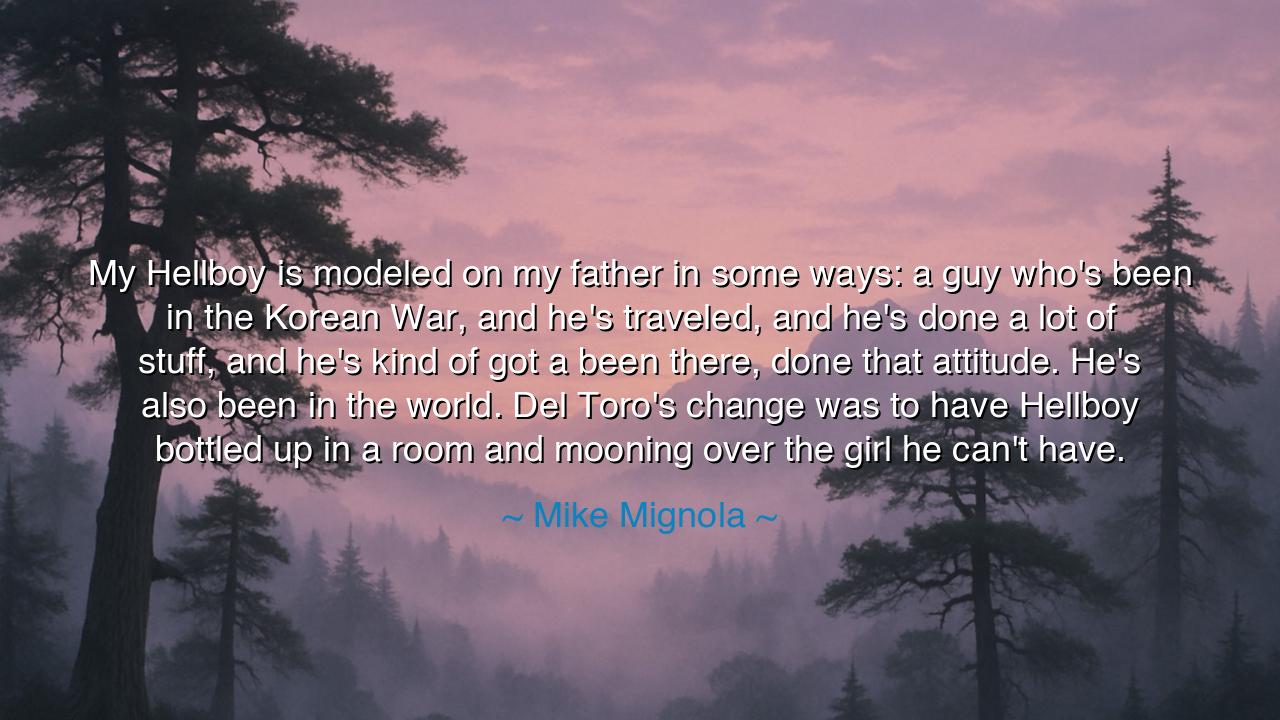
My Hellboy is modeled on my father in some ways: a guy who's been
My Hellboy is modeled on my father in some ways: a guy who's been in the Korean War, and he's traveled, and he's done a lot of stuff, and he's kind of got a been there, done that attitude. He's also been in the world. Del Toro's change was to have Hellboy bottled up in a room and mooning over the girl he can't have.






The soft hum of the café filled the space, mingling with the gentle sound of rain against the window. Jack sat across from Jeeny, his coffee cup in hand, staring out at the rainy streets. Jeeny, sitting opposite him, appeared deep in thought, her fingers tracing the rim of her cup.
Host: After a moment of quiet, Jeeny spoke, her voice contemplative.
Jeeny: “I came across a quote from Mike Mignola today that made me reflect on how characters evolve over time. He said, ‘My Hellboy is modeled on my father in some ways: a guy who’s been in the Korean War, and he’s traveled, and he’s done a lot of stuff, and he’s kind of got a been there, done that attitude. He’s also been in the world. Del Toro’s change was to have Hellboy bottled up in a room and mooning over the girl he can’t have.’ What do you think about that? Do you think that change in Hellboy’s character adds something important, or does it shift his core identity?”
Jack: He looked up at her, his expression thoughtful. “It’s interesting, because Mignola is describing a Hellboy that’s tough, world-weary, and shaped by experience—someone who’s lived through things like the Korean War and has a certain gruff wisdom because of it. But then, Del Toro took that character and added a layer of vulnerability and longing, especially with the romantic subplot. It makes you wonder if that change was meant to humanize Hellboy, to make him more relatable or accessible to the audience. But at the same time, it’s a departure from the tough, almost detached persona Mignola envisioned.”
Jeeny: “Yes, it’s almost like Del Toro’s version softens the character, doesn’t it? In Mignola’s description, Hellboy’s been through the wars, both literal and metaphorical, and he has that pragmatic view of life—he’s lived it and doesn’t have the time for unnecessary emotional drama. Del Toro’s change, though, gives Hellboy a bit of emotional complexity, making him more human in a way, because he has desires and unfulfilled longing. It adds depth, but it does shift him from being a tough, experienced warrior to someone caught in a more internal, almost adolescent kind of conflict.”
Host: The rain outside had softened, but the conversation between them grew deeper as they reflected on the evolution of the character. Jack set his coffee cup down gently, his fingers resting on the edge.
Jack: “It’s funny, though, because both versions of Hellboy still reflect elements of that universal struggle. In Mignola’s version, the battle is with external forces—he’s tough, capable, and faces the world head-on. But in Del Toro’s version, the internal battle is just as powerful. Hellboy is still dealing with the same forces—the weight of being different, the responsibility that comes with power—but now he’s questioning his place in the world in a more personal way. It’s less about being a hero and more about being human.”
Jeeny: “Exactly. It’s the same character at the core, but Del Toro took a different direction by focusing on his emotional growth, especially with the romantic subplot. It’s a different kind of vulnerability, but it’s still rooted in the struggle to find a balance between his humanity and his otherworldly origins. He’s still learning about who he is and what it means to be both a hero and a person with feelings.”
Host: The atmosphere in the café seemed quieter now, as if the conversation had shifted into a deeper understanding of character development. Jack leaned back in his chair, his expression softening as he reflected on the evolution of Hellboy.
Jack: “Maybe that’s what makes Hellboy such a compelling character. Whether he’s the tough, experienced soldier or the more emotionally vulnerable version, he’s always searching for meaning in a world that doesn’t always make sense. Both versions are interesting because they highlight different aspects of the same struggle—how to balance duty, power, and personal desires.”
Jeeny: “Yes, exactly. The journey of self-discovery and finding identity is universal, whether the character is fighting monsters or fighting his own inner conflict. The change in Hellboy’s character reflects that we all have those moments when we’re forced to confront our vulnerabilities and desires, no matter how tough we seem on the outside.”
Host: The rain outside had finally stopped, but inside, Jack and Jeeny sat in the realization that character evolution often involves balancing the external and internal struggles that shape us. Whether in Mignola’s original portrayal or Del Toro’s more nuanced version, Hellboy’s journey remains relatable because it speaks to the universal conflict between power, vulnerability, and self-understanding. The complexity of the character continues to resonate, no matter which path is taken.






AAdministratorAdministrator
Welcome, honored guests. Please leave a comment, we will respond soon